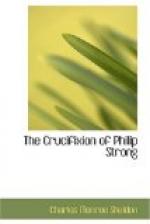“Done,” said Philip, with a grin; and just then Mrs. Strong forbade any more talk. Alfred stayed until the evening train, and when he left he stooped down and kissed Philip’s cheek. “It’s a custom we learned when in the German universities together that summer after college, you know,” he explained with the slightest possible blush, when Mrs. Strong came in and caught him in the act. It seemed to her, however, like an affecting thing that two big, grown-up men like her husband and his old chum showed such tender affection for each other. The love of men for men in the strong friendship of school and college life is one of the marks of human divinity.
CHAPTER VI.
In spite of his determination to get out and occupy his pulpit the first Sunday of the next month, Philip was reluctantly obliged to let five Sundays go by before he was able to preach. During those six weeks his attention was called to a subject which he felt ought to be made the theme of one of his talks on Christ and Modern Society. The leisure which he had for reading opened his eyes to the fact that Sunday in Milton was terribly desecrated. Shops of all kinds stood wide open. Excursion trains ran into the large city forty miles away, two theatres were always running with some variety show, and the saloons, in violation of an ordinance forbidding it, unblushingly flung their doors open and did more business on that day than any other. As Philip read the papers, he noticed that every Monday morning the police court was more crowded with “drunks” and “disorderlies” than on any other day in the week, and the plain cause of it was the abuse of the day before. In the summer time baseball games were played in Milton on Sunday. In the fall and winter very many people spent their evenings in card-playing or aimlessly strolling up and down the main street. These facts came to Philip’s knowledge gradually, and he was not long in making up his mind that Christ would not keep silent before the facts. So he carefully prepared a plain statement of his belief in Christ’s standing on the modern use of Sunday, and as on the other occasions when he had spoken the first Sunday in the month, he cast out of his reckoning all thought of the consequences. His one purpose was to do just as, in his thought of Christ, He would do with that subject.
The people in Milton thought that the first Sunday Philip appeared in his pulpit he would naturally denounce the saloon again. But when he finally recovered sufficiently to preach, he determined that for a while he would say nothing in the way of sermons against the whiskey evil. He had a great horror of seeming to ride a hobby, of being a man of one idea and making people tired of him because he harped on one string. He had uttered his denunciation, and he would wait a little before he spoke again. The whiskey power was not the only bad thing in Milton that needed to




